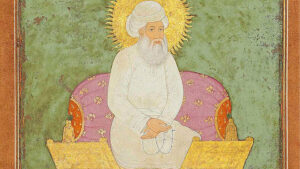Baha’ al-Din Naqshband is one of the prominent Sufi scholars of the 14th century and the founder of the Naqshbandi order. The Naqshbandi order is a path of mysticism that delves deeply into the inner spiritual quest, heart purification, and the goal of closeness to God. Naqshband’s teachings have become one of the most significant schools in Islamic mysticism and have influenced many important Sufi thinkers throughout history.
The Life and Teachings of Baha’ al-Din Naqshband
Baha’ al-Din Naqshband was born in 1318 in Bukhara, where he spent much of his life. His full name was Muhammad bin Muhammad al-Bukhari, and the name Naqshband derives from the village of Naqshband in Bukhara. He began his spiritual journey at a young age and received training from various Sufi masters. Naqshband’s teachings emphasize inner devotion, heart purification, and transcending worldly desires to draw closer to God. His path is distinct in that it focuses more on personal spirituality and direct closeness to God than on ritualistic practices.
Naqshband, like other Sufi masters, emphasizes dhikr (remembrance of God), worship, and moral virtues. However, his teachings focus particularly on spiritual realization through individual effort. According to him, a person must purify their heart and struggle against their ego to truly connect with God. The Naqshbandi order’s practices are based on personal transformation, inner silence, and maintaining a constant awareness of God’s presence.
Core Principles of the Naqshbandi Order
While the Naqshbandi order shares similarities with other Sufi orders in its emphasis on worship, devotion, and self-purification, Baha’ al-Din Naqshband’s approach is marked by a more inward-focused practice and less external ritual. Some of the key principles of the Naqshbandi order are as follows:
- Continuous Dhikr: The Naqshbandi order places great importance on dhikr, but unlike other Sufi traditions, the dhikr is done silently, in the heart. This silent remembrance allows the practitioner to maintain a constant connection to God without outward expressions. The essence of dhikr is not the sound, but the inner awareness of God.
- Inner Purification: Naqshband’s teachings emphasize inner purification over outward displays of piety. According to him, the path of Sufism is not about external rituals or public recognition but about purifying the heart and eradicating worldly desires to get closer to God.
- The Role of the Spiritual Guide (Shaykh): Naqshband emphasized the importance of having a spiritual guide in the Naqshbandi path. A murid (disciple) is expected to follow the guidance of their shaykh, who leads them on their spiritual journey. The shaykh is responsible for nurturing the disciple’s spiritual growth and transformation.
- Detachment from the Material World: While Naqshband taught the importance of being involved in the world, he also emphasized detachment from worldly desires. The goal is not to renounce the world completely but to engage with it in a way that does not interfere with one’s spiritual development.
The Legacy and Impact of Naqshband
Baha’ al-Din Naqshband’s teachings have had a profound impact on many regions, including Anatolia, India, and Central Asia, where the Naqshbandi order continues to thrive today. Although various branches of the Naqshbandi order have emerged over time, the core teachings of Naqshband remain influential in Sufism.
The Naqshbandi order, with its emphasis on inner spiritual development and individual growth, stands out in Sufi traditions. Naqshband’s teachings shaped the practice of Sufism by blending devotion with practical engagement in the world. His order emphasized virtues such as patience, love, tolerance, and humility as essential for the spiritual path.
Conclusion
Baha’ al-Din Naqshband is not only a Sufi teacher and guide but also a spiritual revolutionary. His teachings defined Sufism as a path of inner purification, heart cleansing, and devotion to God. The Naqshbandi order that he founded is unique in its focus on inner spirituality, silent dhikr, and the essential role of the shaykh in guiding disciples. His legacy has had a lasting influence on Sufism, helping shape the spiritual lives of millions throughout history.
Today, the teachings of Baha’ al-Din Naqshband continue to inspire and guide those seeking inner peace, spiritual growth, and a deeper connection with God.



